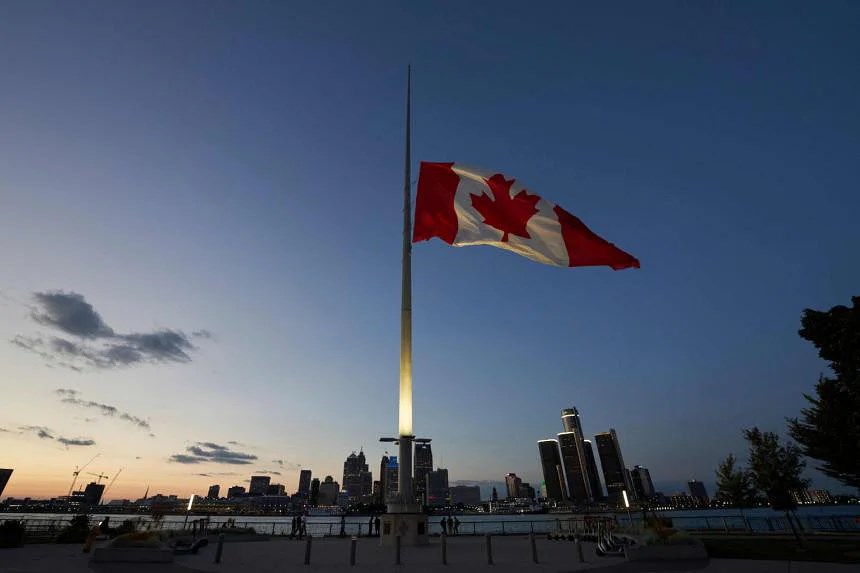Political risks blocking change in 'outdated' monarchy: Poll
According to a survey, 77% of Canadians say they have no loyalty to the British monarchy.
-

The Canadian flag flies at half mast on the Detroit River in Ontario to honour the late Queen Elizabeth, on Sept 13, 2022. PHOTO: AFP
More Canadians are speaking against a foreign monarch representing them, despite the historical ties to Britain, but any constitutional reform would introduce risks of political change.
Beginning in the late 1500s, Britain began to occupy Canada, and the nation was part of the British empire until 1982. It now belongs to the Commonwealth, a group of former imperial states where the British monarch serves as head of state.
Canadian cities like London and Windsor reflect enduring ties. However, according to an Angus Reid Institute poll from April, 51% of Canadians revealed that they do not want the monarchy to continue as their ceremonial figurehead, up from 45% in January 2020. Only 26% of respondents said it should and 24% were unsure.
According to a Leger poll published on Tuesday, some 77% of Canadians said they feel no attachment to the British monarchy.
"Canada is the only G7 country whose head of state is another country's citizen," said Flavio Volpe, president of Canada's Automotive Parts Manufacturers' Association.
"I prefer someone from Windsor than from the House of Windsor" to be head of state, said Volpe, referring to the Canadian city across the river from Detroit.
"We should have serious conversations as a country about whether we can find a Canadian to fill a ceremonial post."
Read next: Majority of Canadians back abolishing monarchy
Although there was a tremendous outpouring of love in Canada after Queen Elizabeth passed away last week, most people find dealing with a foreign monarch uncomfortable. The British King Charles' coronation was announced at a ceremony on Saturday in Ottawa.
"The monarchy is outdated and has no relevance in our government. I think it's time we just stood on our own," said John Nielsen, 61, a contractor in Ottawa.
Residents in Quebec, a majority-French-speaking province, have even less affinity for Britain; 71% of them said monarchy is no longer necessary in an Angus Reid poll and 87% said they have no feelings of loyalty to the royal family in a Leger poll.
The Indigenous community typically has little affection for the former colonial power, and one-fifth of Canada's population are recent immigrants with little connection to Britain. Indigenous activists demolished a statue of the queen in 2021 on the grounds of the Manitoba legislature as an illustration of their feelings.
"Besides a whole lot of photo opportunities alongside chiefs in headdresses, the reign of Queen Elizabeth will forever be marked by inaction," Niigaan Sinclair, a professor of Indigenous Studies at the University of Manitoba, said in a column for the Winnipeg Free Press published after her death.
'As long as the rivers flow'
When questioned about his views on the monarchy on Tuesday, Liberal Prime Minister Justin Trudeau said that while he is always willing to "strengthen" Canada's democracy, "Canadians are almost fully engaged with the enormous issues we're confronting" like climate change and the economy.
Trudeau declared that his administration would concentrate on the issues crucial to Canadians without backing the monarchy or closing the door to a discussion.
Malloy said he is personally "uncomfortable" with the constitutional monarchy and "its feudal, colonial, and wildly elitist underpinnings," adding, however, that "it does basically work" and so changing it is "a low political priority."
Read next: World reacts to Queen Elizabeth II death, King Charles mourns mother
RoseAnne Archibald, the national chief of the First Nations, did not support a constitutional reform but dismissed worries about how a change to the constitution would affect existing treaties.
"First Nations will always have a relationship with the Crown no matter what Canada does as a corporation," Archibald told Reuters. "As long as the sun shines, the rivers flow and the grass grows, these covenants remain in effect."
Read next: Charles III may be the last king of Britain: Expert

 4 Min Read
4 Min Read








